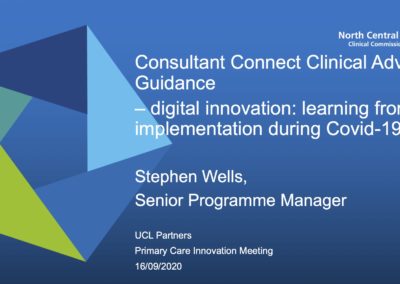‘The patient was more involved in his care and the whole process felt like a more connected approach without the divide between primary and secondary care.’ – Dr Ross
Clinicians in South East London ICB have access to Telephone Advice & Guidance and Photo Advice & Guidance via Consultant Connect to speak to local and out-of-area NHS consultants on the National Consultant Network (NCN).
We spoke with Drs Cristina Guallar and Andrew Ross, GPs in Southwark and Lambeth, respectively, to find out how their access to Enhanced Advice & Guidance helps them provide the best care for their patients.
We also spoke to Dr Patrick Davey, NHS Consultant Cardiologist on the NCN, who answered the GPs queries.
Patient Examples
Dr Guallar
‘I saw an elderly patient because she was breathless. She was last seen by her local cardiology team 18 months previously with some narrowing of the aortic valve.
I found that she had fluid retention, including swollen ankles, and a heart rhythm disturbance, which was atrial fibrillation.
I was aware that atrial fibrillation in an elderly patient with heart problems creates a very high risk of blood clots in the heart, which can cause a stroke.
Therefore, I needed to start blood-thinning drugs as soon as possible. Still, I wasn’t sure of the interaction with the patient’s abdominal aortic aneurysm, which would be life-threatening if ruptured.
I contacted Dr Davey via the Consultant Connect App and was very grateful for his input in my patient’s case.
Dr Davey’s thorough advice was didactic and helped me a great deal in deciding on a management plan and to expedite the referral to the anticoagulant clinic.’
Dr Davey
‘I reassured Dr Guallar that the benefit of blood thinners outweighed this risk and that this should be started today with a drug that would work immediately.
Additionally, it seemed likely that the patient’s breathlessness was caused by a further narrowing of her aortic valve that had put pressure on the heart and resulted in rhythm disturbance and inefficiency of the heart, resulting in fluid retention. Accordingly, I advised Dr Guallar that a very early assessment by the local cardiology clinic was mandated. I suggested that she contact the local cardiology department requesting that the patient be seen within a week to 10 days to evaluate whether she was suitable for some form of aortic valve operation to relieve her symptoms and prolong life.
Without this phone conversation, it is likely that the referral would have been through the standard route and could have taken many months, during which time the patient would have been at risk of stroke and may have died from her narrowed aortic valve.’
Dr Ross
‘A patient had recently returned from holiday where he had experienced chest pains and had gone to the local hospital, where he was diagnosed with pericarditis. I then saw the patient a few weeks later with ongoing symptoms. I called Dr Davey via Consultant Connect to determine whether the symptoms matched the diagnosis. Dr Davey reassured me that this was the case and that some simple outpatient tests and treatment for the patient’s inflamed pericardium were appropriate.
I find Consultant Connect very convenient for getting quick advice when needed from specialist consultants. I was put through quickly and gained the information I needed to manage the patient effectively.
The patient felt at ease that this would all be done whilst he was in the clinic with me, and he did not have to wait for an answer or return later. By speaking with Dr Davey directly, the patient was more involved in his care and decision process and felt comfortable that our advice was appropriate. From my point of view, it felt like a more connected approach without the divide between primary and secondary care.’
Dr Davey
‘Dr Ross then informed me that the patient had taken cocaine which changed the complexity of the case, and I advised that we needed to be certain that the symptoms were not due to a complication of cocaine, which can cause heart attacks and inflammation of the lining of the heart.
I advised Dr Ross to refer the patient to the local cardiology department to ensure the cocaine had not damaged the patient’s heart, as this would have future implications. Dr Ross had already informed the patient of the dangers of cocaine use. In summary, therefore, I was able to help with the management of pericarditis and advise appropriate evaluation.’





